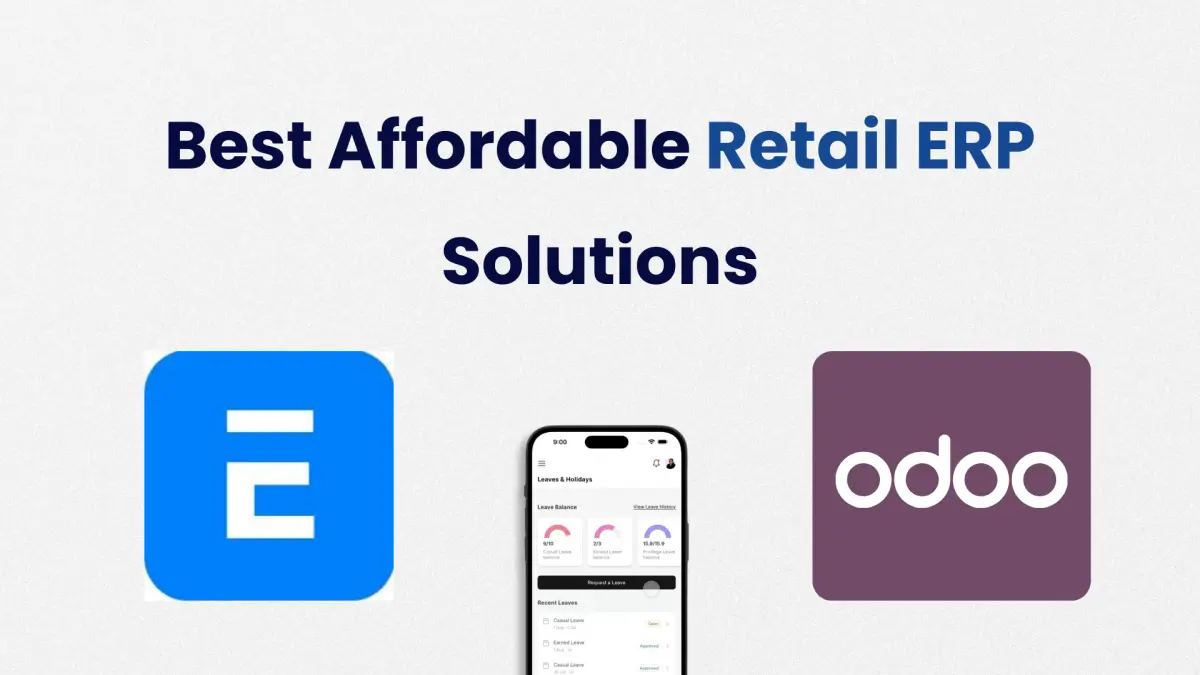Finding the right affordable retail ERP solution is crucial for startups looking to streamline operations without breaking the bank. With countless ERP systems available, choosing one that fits your budget and business needs can be overwhelming.
This guide simplifies your search by exploring the best cost-effective retail ERP solutions for startups. We’ll compare features, pricing, and benefits, helping you make an informed decision for 2025.
- Understanding Retail ERP for StartupsWhat is an ERP System?
- Why Startups Need ERP Solutions
- Key Features to Look for in an Affordable Retail ERP1. Inventory and Stock Management
- 2. Sales and Customer Tracking
- 3. Accounting and Financial Management
- 4. Scalability and Integrations
- Cloud-Based vs. On-Premise ERP: Which is Better for Startups?1. Cost Differences and Affordability
- 2. Flexibility and Accessibility Considerations
- 3. Security and Maintenance Factors
- Best Budget-Friendly Retail ERP SolutionsOdoo
- Zoho Inventory
- ERPNext
- Brightpearl
- Open-Source ERP Solutions: A Cost-Effective AlternativeAdvantages of Open-Source ERP for Startups
- Popular Open-Source ERP Platforms
- Subscription-Based ERP vs. One-Time Payment ModelsPros and Cons of Each Pricing Model
- Choosing the Right Fit for Your Business
- How to Choose the Right ERP for Your StartupAssessing Business Needs and Goals
- Evaluating User-Friendliness and Support
- Considering Future Scalability
- Implementation Challenges and How to Overcome ThemCommon Obstacles Startups Face
- Strategies for Smooth ERP Adoption
- Maximizing ROI with an Affordable ERP Solution1. Reducing Operational Costs
- 2. Improving Efficiency and Productivity
- 3. Leveraging Data Insights for Growth
- Future Trends in Retail ERP for StartupsAI and Automation in ERP
- Mobile-First ERP Solutions
- Emerging Technologies Shaping the Future
- Conclusion
Understanding Retail ERP for Startups
What is an ERP System?
An ERP system is a software platform designed to integrate and manage core business processes such as inventory management, sales, accounting, and customer relationships. For retail businesses, an ERP system acts as a centralized hub, ensuring seamless communication between different departments and improving overall efficiency.
Think of an ERP system as the backbone of your business operations. It connects all the dots, from tracking inventory levels to processing customer orders and managing finances. Without an ERP system, startups often rely on multiple disconnected tools, leading to inefficiencies, errors, and missed opportunities.
Why Startups Need ERP Solutions
Startups often operate with limited resources and tight budgets, making it crucial to optimize operations from the outset. An ERP system helps startups:
- Streamline Workflows: Automate repetitive tasks and reduce manual errors.
- Gain Real-Time Insights: Access up-to-date information on inventory, sales, and finances.
- Scale Operations: Grow your business without outgrowing your systems.
- Improve Customer Satisfaction: Enhance order tracking, delivery times, and customer service.
For example, imagine a startup selling handmade products online. Without an ERP system, managing inventory across multiple sales channels (e.g., website, Amazon, Etsy) can quickly become overwhelming. An ERP system simplifies this process by centralizing data and automating updates.
Key Features to Look for in an Affordable Retail ERP
When choosing an ERP system, startups should prioritize features that deliver the most value for their investment. Here’s a deeper look at the key features to consider:
1. Inventory and Stock Management
Effective inventory management is critical for retail startups. Look for an ERP system that offers:
- Real-Time Stock Tracking: Monitor inventory levels across multiple locations.
- Automated Reordering: Set up alerts for low stock levels to avoid stockouts.
- Demand Forecasting: Analyze sales trends to predict future inventory needs.
For instance, a startup selling seasonal products can use demand forecasting to ensure they have enough stock during peak seasons without overordering.
2. Sales and Customer Tracking
A good ERP system should provide tools for tracking sales and managing customer relationships. Key features include:
- Sales Analytics: Track sales performance and identify trends.
- Customer Relationship Management (CRM): Store customer data, track interactions, and manage loyalty programs.
- Order Tracking: Provide customers with real-time updates on their orders.
These features help startups understand customer behavior, improve sales strategies, and build long-term relationships.
3. Accounting and Financial Management
Affordable ERP systems should include basic accounting features such as:
- Invoicing: Generate and send invoices automatically.
- Expense Tracking: Monitor business expenses and cash flow.
- Financial Reporting: Create reports for taxes, audits, and decision-making.
By integrating accounting into the ERP system, startups can save time and reduce the risk of errors.
4. Scalability and Integrations
Startups need ERP systems that can grow with their business. Look for solutions that offer:
- Scalability: Handle increased data, users, and transactions as your business grows.
- Integrations: Connect with other tools like eCommerce platforms, payment gateways, and marketing software.
For example, a startup using Shopify for online sales should choose an ERP system that integrates seamlessly with Shopify.
Cloud-Based vs. On-Premise ERP: Which is Better for Startups?
1. Cost Differences and Affordability
Cloud-based ERP systems are typically more affordable for startups. They operate on a subscription model with no upfront hardware costs, making cloud ERP for startups an ideal choice for budget-conscious businesses.
For example, a cloud-based ERP system might cost 50−50−100 per user per month, while an on-premise solution could require a one-time payment of $10,000 or more, plus maintenance fees.
2. Flexibility and Accessibility Considerations
Cloud-based ERP systems offer greater flexibility, allowing startups to access data from anywhere with an internet connection. This is particularly beneficial for remote teams or businesses with multiple locations.
3. Security and Maintenance Factors
While cloud-based ERP systems are generally secure, startups must ensure their provider offers robust data encryption and compliance with industry standards. On-premise solutions may offer more control over security but require dedicated IT resources for maintenance.
Best Budget-Friendly Retail ERP Solutions
Here’s an in-depth look at some of the most affordable ERP solutions for startups:
Odoo
- Starting Price: $10/user/month
- Key Features: Modular, customizable, integrations with popular tools.
- Best For: Startups looking for flexibility and scalability.
Zoho Inventory
- Starting Price: $29/month
- Key Features: Inventory management, order tracking, eCommerce integrations.
- Best For: Small retail businesses with simple needs.
ERPNext
- Starting Price: $5/user/month
- Key Features: Open-source, comprehensive features, scalable.
- Best For: Startups seeking a cost-effective, all-in-one solution.
Brightpearl
- Starting Price: $55/month
- Key Features: Retail-focused, advanced reporting, inventory management.
- Best For: Growing retail businesses with complex needs.
Open-Source ERP Solutions: A Cost-Effective Alternative
Advantages of Open-Source ERP for Startups
- Cost Savings: No licensing fees and lower upfront costs.
- Customizability: Tailor the system to meet specific business needs.
- Community Support: Access to a global community of developers and users.
Popular Open-Source ERP Platforms
- ERPNext: A user-friendly, feature-rich solution for small to medium-sized businesses.
- Odoo: Offers a modular approach, allowing startups to pay only for the features they need.
- Dolibarr: A simple yet powerful ERP system for small businesses.
Subscription-Based ERP vs. One-Time Payment Models
Pros and Cons of Each Pricing Model
- Subscription-Based ERP:
- Pros: Lower upfront costs, regular updates, and scalability.
- Cons: Ongoing costs can add up over time.
- One-Time Payment Models:
- Pros: No recurring fees, full ownership of the software.
- Cons: Higher initial investment, limited updates and support.
Choosing the Right Fit for Your Business
Startups with limited budgets may prefer subscription-based models for their affordability and flexibility. However, businesses planning for long-term use might benefit from one-time payment models.
How to Choose the Right ERP for Your Startup
Assessing Business Needs and Goals
Identify your startup’s specific requirements, such as inventory management, sales tracking, or financial reporting. Choose an ERP system that aligns with these needs.
Evaluating User-Friendliness and Support
Ensure the ERP system is easy to use and offers reliable customer support. A steep learning curve can hinder adoption and productivity.
Considering Future Scalability
Select an ERP solution that can grow with your business, accommodating increased data, users, and features as needed.
Implementation Challenges and How to Overcome Them
Common Obstacles Startups Face
- Resistance to change from employees.
- Data migration issues.
- Budget constraints.
Strategies for Smooth ERP Adoption
- Provide comprehensive training for employees.
- Start with a phased implementation approach.
- Work closely with the ERP provider for support.
Maximizing ROI with an Affordable ERP Solution
1. Reducing Operational Costs
Automate repetitive tasks and streamline workflows to save time and money.
2. Improving Efficiency and Productivity
Centralize data and processes to eliminate silos and improve collaboration.
3. Leveraging Data Insights for Growth
Use ERP analytics to make data-driven decisions and identify growth opportunities.
Future Trends in Retail ERP for Startups
AI and Automation in ERP
AI-powered ERP systems will offer advanced analytics, predictive insights, and automation capabilities.
Mobile-First ERP Solutions
Mobile-friendly ERP systems will enable startups to manage operations on the go.
Emerging Technologies Shaping the Future
Blockchain, IoT, and machine learning will further enhance ERP capabilities, offering startups new ways to optimize operations.
Conclusion
Investing in an affordable retail ERP system is a game-changer for startups aiming to streamline operations, reduce costs, and scale efficiently. The right ERP solution doesn’t just manage inventory and sales—it empowers your business with data-driven insights, automation, and seamless integration to enhance overall efficiency.
At Infintrix Technologies, we understand the challenges startups face in adopting ERP solutions. That’s why we offer customized, budget-friendly retail ERP systems designed to grow with your business. Whether you need inventory tracking, customer management, or real-time analytics, our solutions ensure you get the best value without unnecessary complexity.

